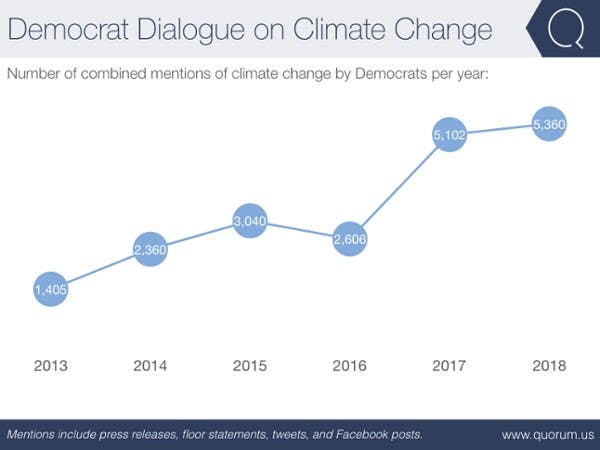When President Donald Trump delivered his first State of the Union address nearly a year ago, he didn’t talk about climate change. But he didn’t get criticized nearly as much as the Democratic Party did for failing to mention the topic in its official response to Trump’s speech. The omission led the Sierra Club to declare that Democrats had “a climate change problem,” while the far-right website Breitbart announced that global warming had “officially ceased being an important issue in U.S. politics. #Winning!”
But the political climate in Washington has changed since then, especially after Democrats won back the House of Representatives in last month’s blue wave. Environmental protestors have flooded the Capitol twice in high-profile demonstrations, demanding senior Democratic leaders support a “Green New Deal.” Recent polling shows that Democratic voters are prioritizing climate change as an issue for the next Congress. And Democratic presidential hopefuls for 2020 are facing pressure to support aggressive climate policies.
That last development is particularly surprising given that most Democratic candidates didn’t talk about global warming at all during their midterm campaigns. So what happened? Who is responsible for this newfound climate enthusiasm, and is it sustainable? Will it lead to meaningful action over the next two years, or peter out by 2020?
Some credit must be given to progressive darlings like incoming New York Congresswoman Alexandria Ocasio-Cortez and three-term Texas Congressman Beto O’Rourke, who showed with their midterm campaigns that it was possible to mobilize voters around the promise of comprehensive climate legislation. O’Rourke lost his challenge to Senator Ted Cruz by fewer than 3 points, despite running as a staunch environmentalist in an extremely Republican state. Ocasio-Cortez’s campaign centered on creating a Green New Deal, an ambitious plan inspired by FDR’s New Deal to invest trillions in renewable energy development and manufacturing. At the time, climate scientists told me that, if Democrats ever decided to mobilize on global warming, a plan as aggressive as Cortez’s could make a tangible difference in lessening some of warming’s expected catastrophic effects.
The Green New Deal received some attention over the summer, but public interest in it has spiked in the last month. That’s likely because of the two protests organized by the Sunrise Movement, a nascent group of young environmental activists. The first took place on the first day of orientation for incoming House members, where about 200 protestors—joined by Ocasio-Cortez—staked out House Minority Leader Nancy Pelosi’s office and demanded the creation of a select committee for a Green New Deal. In response, Pelosi announced that she would support a new committee—but did not say whether she would give the committee any power to craft legislation.
Hence the second, much larger action. On Monday, about 1,000 people flooded the Capitol to ask Democratic members of Congress to support the creation of a select committee with actual power to draft a Green New Deal. Some activists were also arrested after putting up a banner in front of Pelosi’s office. In response to those protests, another senior Democratic leader—Representative Jim McGovern—said he would support the creation of a committee.
50 days ago, @TheDemocrats told us that climate wasn't on the agenda for 2019.
— Sunrise Movement 🌅 (@sunrisemvmt) December 7, 2018
Today, every major Democratic leader is calling for ambitious climate action in 2019.
Let's be clear: This happened because tens of thousands of us took bold action for a #GreenNewDeal. pic.twitter.com/DKvpto3zXk
The Green New Deal protests have received some criticism because they target Democrats, not Republicans. “Why target Pelosi, who has always been a climate champion?” Dave Roberts wrote for Vox last month. “Aren’t there worse enemies of the climate to protest?” But there’s no denying that the protests have drawn national attention to an issue that’s normally pushed to the side. An analysis released Tuesday by public affairs software company Quorum showed that this year, Democrats in Congress have talked about climate change more than they ever have.

Politicians like Ocasio-Cortez and groups like the Sunrise Movement can’t take all the credit for that. Some momentum is likely due to the sheer fact that climate change is getting worse. This year’s record-breaking hurricanes, flooding, and wildfires “have added new urgency to the discussion,” Axios noted on Tuesday, as have “alarming new reports describing the damage that climate change may inflict on the planet in the future.” Among the most worrisome was a United Nations report authored by international consortium of climate scientists, showing a strong risk of global crisis by 2040 if immediate, aggressive action isn’t taken.
And then, of course, there’s Trump. As climate change worsens, to the increasing detriment of the economy, food system, national security, and human health, the president not only continues to deny that there’s a crisis, but seems intent on exacerbating it. He is withdrawing the U.S. from the Paris climate agreement, and his administration has announced a staggering number of rollbacks of regulations on carbon emissions, fuel efficiency, clean air, pesticides, wilderness protection, oil and gas drilling, and much more. What’s a better motivator for action than that?
Those on the political left who have pushed for climate action over the years may be skeptical that the Democrats’ sudden enthusiasm will manifest in meaningful policy. Yes, there is a demonstrable increase in dialogue about global warming, but dialogue is all it is right now. Without the power to create legislation, a committee for a Green New Deal similarly would be all talk. The only way to ensure that Washington takes action to reverse this existential crisis will be through continued pressure from voters—not just those getting arrested on Capitol Hill, but those who turn out in 2020.
